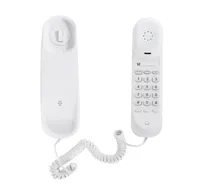Is It Time to Cut the Cord on Your Landline?
With rising costs and evolving technology, many are rethinking their home phone service. Here's how to decide if it's time to let go.


Profit and prosper with the best of Kiplinger's advice on investing, taxes, retirement, personal finance and much more. Delivered daily. Enter your email in the box and click Sign Me Up.
You are now subscribed
Your newsletter sign-up was successful
Want to add more newsletters?

Delivered daily
Kiplinger Today
Profit and prosper with the best of Kiplinger's advice on investing, taxes, retirement, personal finance and much more delivered daily. Smart money moves start here.

Sent five days a week
Kiplinger A Step Ahead
Get practical help to make better financial decisions in your everyday life, from spending to savings on top deals.

Delivered daily
Kiplinger Closing Bell
Get today's biggest financial and investing headlines delivered to your inbox every day the U.S. stock market is open.

Sent twice a week
Kiplinger Adviser Intel
Financial pros across the country share best practices and fresh tactics to preserve and grow your wealth.

Delivered weekly
Kiplinger Tax Tips
Trim your federal and state tax bills with practical tax-planning and tax-cutting strategies.

Sent twice a week
Kiplinger Retirement Tips
Your twice-a-week guide to planning and enjoying a financially secure and richly rewarding retirement

Sent bimonthly.
Kiplinger Adviser Angle
Insights for advisers, wealth managers and other financial professionals.

Sent twice a week
Kiplinger Investing Weekly
Your twice-a-week roundup of promising stocks, funds, companies and industries you should consider, ones you should avoid, and why.

Sent weekly for six weeks
Kiplinger Invest for Retirement
Your step-by-step six-part series on how to invest for retirement, from devising a successful strategy to exactly which investments to choose.
With smartphones in nearly every pocket and internet-based alternatives offering budget-friendly call options, many are asking: Do I really need a landline anymore?
The answer isn’t one-size-fits-all. For some, a traditional home phone service still plays a practical or emotional role. But for others, it’s just another monthly expense that might be easy to eliminate.
If you’re wondering whether it’s time to get rid of your landline, here’s what to consider.
From just $107.88 $24.99 for Kiplinger Personal Finance
Become a smarter, better informed investor. Subscribe from just $107.88 $24.99, plus get up to 4 Special Issues

Sign up for Kiplinger’s Free Newsletters
Profit and prosper with the best of expert advice on investing, taxes, retirement, personal finance and more - straight to your e-mail.
Profit and prosper with the best of expert advice - straight to your e-mail.
Why some people still keep their landlines
While many households have moved on from traditional landlines, there are still valid reasons why some choose to keep them. One of the most compelling arguments is reliability.
In areas prone to storms, power outages or weak cell signals, a landline connected through copper wiring can continue to function when other options fail. This reliability can be especially important during emergencies when having access to a working phone could make all the difference.
Call quality is another factor. Although smartphones have improved dramatically, some people still experience dropped calls or poor reception, especially indoors or in rural areas. Landlines, by contrast, tend to offer clear and consistent audio quality without the worry of dropped calls.
Safety is also a key concern for some users. When you dial 911 from a landline, for example, emergency services can immediately identify your exact physical address. This might not be the case with a cell phone, particularly if you're in a large apartment complex or a rural location. So, a landline can provide added peace of mind for families with children, seniors or those with health concerns.
But there’s also a comfort factor for some people who prefer the simplicity and familiarity of a home phone rather than a smartphone.
Wall-mountable landline phone with slim design. No AC power needed. Good for emergencies or simple home use.
Why more people are cutting the cord
Despite these advantages, more and more households are deciding that their landline just isn’t worth the cost or hassle anymore. Traditional landline service can cost anywhere from $30 to $50 per month, even more if it’s part of a bundled package with cable and internet.
In many households, everyone already owns a cell phone with unlimited talk and text as well. That makes a landline feel like a backup to a backup.
Cell phones allow you to make and receive calls from virtually anywhere, whether you're traveling, running errands or relaxing in the backyard. You’re no longer tethered to a cord or forced to screen calls through an answering machine.
Technology has also opened up even more alternatives. Consider that VoIP services like Ooma and Google Voice offer many of the same benefits of a landline, such as a dedicated number and voicemail, and without the high monthly fees.
Speakers with voice-calling capabilities are additionally giving people ways to stay connected without needing a traditional home phone setup.
How to decide what’s right for you

Before you call your provider and cancel your home phone, take a moment to reflect on your actual needs.
Ask yourself:
- Do I actually use my landline, or am I just keeping it out of habit?
- Is it bundled with my internet or cable package and will canceling it raise my overall bill?
- Do I live in an area with spotty cell coverage?
- Are there devices in my home that rely on a landline connection?
If you're still unsure, track your landline usage for a few weeks and compare it to your mobile usage. The answer might become clear pretty quickly.
Alternatives to traditional home phones
If you do decide to make the switch, you won’t be without options.
Cell phones: Most people already have one and they’re increasingly affordable. For older adults looking for low-cost plans, T-Mobile’s 55+ Plans offer great value with unlimited talk, text and data. You might even qualify for a free iPhone when switching to a new plan.
VoIP services: If you still want a “home phone” setup with a base and handset, internet-based options like Ooma or MagicJack can offer that experience often at a much lower price. Many come with free long-distance calling and extra features like voicemail-to-email.
Smart devices: Voice assistants like Alexa and Google Home now allow you to make calls with just a voice command. For tech-savvy users this can be a seamless replacement for a traditional phone.
Amazon Echo Show 5 (Latest Model). Make hands-free video and voice calls with Alexa. Features a smart display and clearer sound in a compact Cloud Blue design.
What to know before you cancel
If you’re ready to cut the cord, keep these steps in mind:
- Check your bundle: If your phone is part of a package deal, canceling could unexpectedly increase your internet bill. Call your provider to confirm.
- Port your number: Want to keep your longtime number? You can often transfer it to a mobile or VoIP provider.
- Update emergency contacts: Be sure your loved ones, doctor’s office and security system provider (if applicable) have your mobile number on file.
- Test drive it: Try relying on your cell phone for a month before canceling your landline to make sure you don’t miss it.
The question isn’t whether everyone should cancel their landline, it’s whether you should. For many, getting rid of a landline can cut costs without cutting communication. For others, especially those in rural areas or with medical needs, keeping a home phone might still make sense.
Either way, evaluating your current usage and exploring alternatives is a smart move.
Related Content:
Profit and prosper with the best of Kiplinger's advice on investing, taxes, retirement, personal finance and much more. Delivered daily. Enter your email in the box and click Sign Me Up.

Choncé is a personal finance freelance writer who enjoys writing about eCommerce, savings, banking, credit cards, and insurance. Having a background in journalism, she decided to dive deep into the world of content writing in 2013 after noticing many publications transitioning to digital formats. She has more than 10 years of experience writing content and graduated from Northern Illinois University.
-
 Quiz: Do You Know How to Avoid the "Medigap Trap?"
Quiz: Do You Know How to Avoid the "Medigap Trap?"Quiz Test your basic knowledge of the "Medigap Trap" in our quick quiz.
-
 5 Top Tax-Efficient Mutual Funds for Smarter Investing
5 Top Tax-Efficient Mutual Funds for Smarter InvestingMutual funds are many things, but "tax-friendly" usually isn't one of them. These are the exceptions.
-
 AI Sparks Existential Crisis for Software Stocks
AI Sparks Existential Crisis for Software StocksThe Kiplinger Letter Fears that SaaS subscription software could be rendered obsolete by artificial intelligence make investors jittery.
-
 One of the Most Powerful Wealth-Building Moves a Woman Can Make: A Midcareer Pivot
One of the Most Powerful Wealth-Building Moves a Woman Can Make: A Midcareer PivotIf it feels like you can't sustain what you're doing for the next 20 years, it's time for an honest look at what's draining you and what energizes you.
-
 I'm a Wealth Adviser Obsessed With Mahjong: Here Are 8 Ways It Can Teach Us How to Manage Our Money
I'm a Wealth Adviser Obsessed With Mahjong: Here Are 8 Ways It Can Teach Us How to Manage Our MoneyThis increasingly popular Chinese game can teach us not only how to help manage our money but also how important it is to connect with other people.
-
 Looking for a Financial Book That Won't Put Your Young Adult to Sleep? This One Makes 'Cents'
Looking for a Financial Book That Won't Put Your Young Adult to Sleep? This One Makes 'Cents'"Wealth Your Way" by Cosmo DeStefano offers a highly accessible guide for young adults and their parents on building wealth through simple, consistent habits.
-
 My Spouse and I Are Saving Money for a Down Payment on a House. Which Savings Account is the Best Way to Reach Our Goal?
My Spouse and I Are Saving Money for a Down Payment on a House. Which Savings Account is the Best Way to Reach Our Goal?Learn how timing matters when it comes to choosing the right account.
-
 We're 78 and Want to Use Our 2026 RMD to Treat Our Kids and Grandkids to a Vacation. How Should We Approach This?
We're 78 and Want to Use Our 2026 RMD to Treat Our Kids and Grandkids to a Vacation. How Should We Approach This?An extended family vacation can be a fun and bonding experience if planned well. Here are tips from travel experts.
-
 Why Most Millionaires Don't Feel Wealthy — and What It Really Takes to Feel Financially Secure
Why Most Millionaires Don't Feel Wealthy — and What It Really Takes to Feel Financially SecureA growing share of Americans reach millionaire status yet still worry about money. Here's why wealth feels different today and how to build true financial confidence.
-
 You Could Be Overpaying for Internet. Here’s How to Choose the Right Type
You Could Be Overpaying for Internet. Here’s How to Choose the Right TypeFiber, cable, 5G wireless and satellite internet all offer different speeds, reliability and price points. Understanding the differences could help you lower your monthly bill or improve performance.
-
 My First $1 Million: Retired From Real Estate, 75, San Francisco
My First $1 Million: Retired From Real Estate, 75, San FranciscoEver wonder how someone who's made a million dollars or more did it? Kiplinger's My First $1 Million series uncovers the answers.

